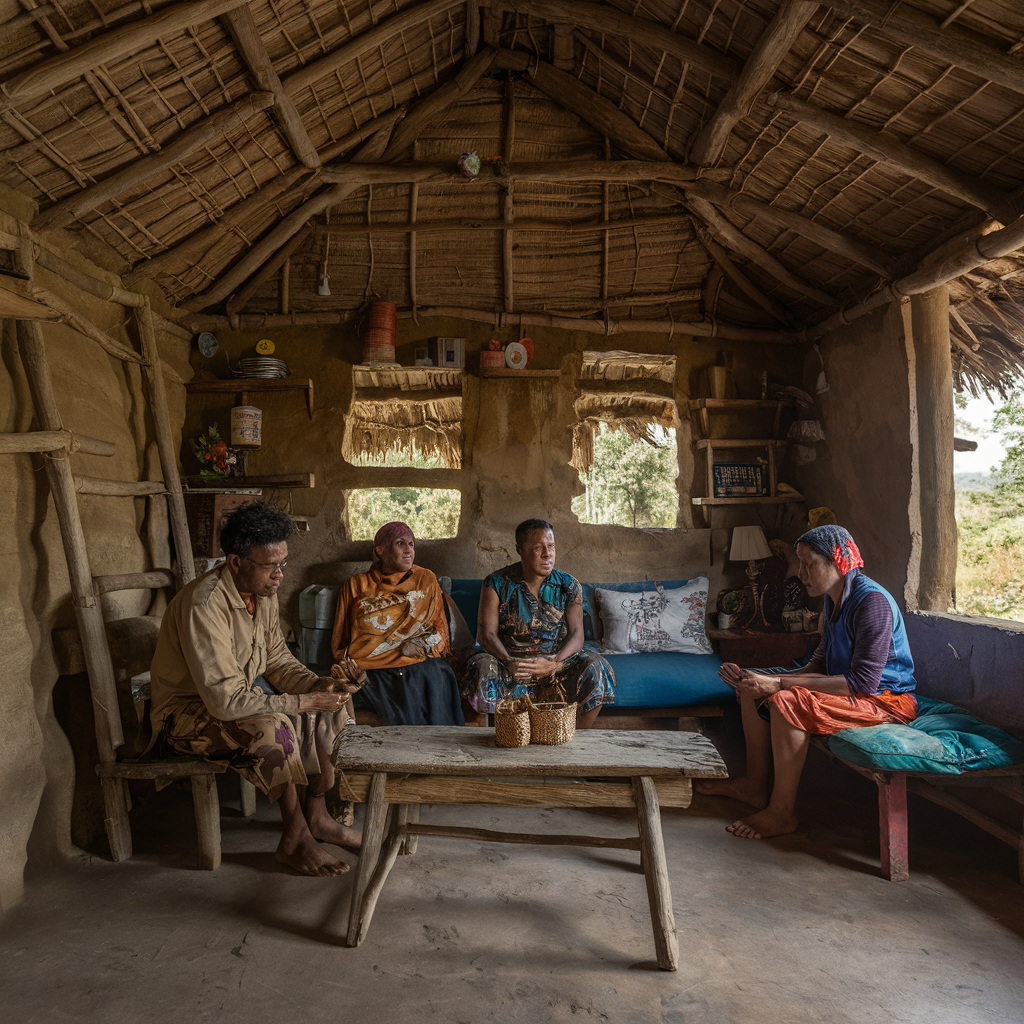Living with locals in remote villages lets you dive deep into their culture. You get to see their daily life and join in on their celebrations. This way, you build strong bonds with the community and feel what it’s like to be a part of it. Staying for weeks or even months is best to really get to know the culture.
Exploring these villages shows you how different life can be. You’ll see how people live, eat, and talk. It’s a chance to grow and see things from a new view. Most travelers say living with locals changed how they see life, teaching them to value simplicity and community.
Before you go, learn some local phrases to talk better with people. And remember, pack clothes that fit the local weather. It’s also key to support local shops, respect their ways, and care for the environment. Doing this makes your visit respectful and meaningful. Living with locals teaches you to value simple joys and relationships more than stuff.
Key Takeaways
- Immerse yourself fully by staying a few weeks to several months in the village.
- Encounter and adapt to cultural differences in social norms, dietary habits, and communication styles.
- Learn basic local phrases to facilitate better communication with locals.
- Pack light and practical clothing suitable for the village’s climate.
- Support local businesses, respect customs, and minimize environmental impact for a responsible experience.
- Living with locals fosters an appreciation for simplicity, emphasizing values like community bonds, gratitude, and simplicity.
Understanding the Importance of Cultural Immersion
Cultural immersion is more than just visiting a place. It’s a deep dive into a community’s life. You take part in local customs and practices, not just watch from the side.
Defining Cultural Immersion
Cultural immersion means fully joining a community and living like a local. It’s a way to get deep cultural insights by being part of daily life. Most students who study abroad choose this kind of experience. They feel they really got to know the culture.
By doing this, you break down stereotypes and connect truly with people. It’s a powerful way to understand others better.
Benefits of Cultural Immersion
There are many good things about cultural immersion. It helps people talk better with people from other cultures. In fact, 70% of those who studied abroad say it made them more skilled at it.
Those who really get into the culture are 30% more sensitive to it than regular tourists. It helps you grow personally and can open up new job chances. It also teaches you to value diversity and understand different ways of life.
The Role of Empathy and Perspective
Getting to know a culture deeply helps you feel more empathetic and open-minded. It’s key in our global world. By living like a local and supporting local businesses, you see things from their point of view.
This kind of experience makes you value different cultures more. It helps you break down stereotypes and build a stronger bond with the world’s diverse cultures.
Preparing for Living with Locals in Remote Villages
Living with locals in remote villages means you need to prepare well. This guide will help you make the most of your stay. It covers important steps to enjoy and learn from the experience.
Researching the Village
It’s key to do cultural research before you go. For example, Kampong Melano village in Malaysian Borneo is small, with only about 200 people. You’ll need to be respectful of their community.
Places like San Juan La Laguna in Lake Atitlan are also worth learning about. Most of its people are indigenous Mayans who face job challenges. Knowing this can help you connect better and communicate more effectively.
Learning Basic Local Phrases
Learning the local language is important for making friends. Even simple words can make a big difference. Think about learning greetings and common phrases for places like the Amazon Jungle tour in Ecuador or a stay in Arequipa, Peru.
This will help everyone understand each other better. It shows you respect the local culture.
Mental and Emotional Preparation
Being emotionally strong is key when you’re in a new place. You’ll see different customs and might feel culture shock. But, staying positive and open-minded helps a lot.
It’s also important to respect local rules, like not drinking in public in some places. Or, knowing how to eat with your hands in Zambia. This makes your stay smoother.
Empathy and an open heart are your best travel companions when living with local communities.
By getting ready, doing cultural research, learning local phrases, and being emotionally strong, you’ll have a great time. You’ll also show respect for the culture you’re experiencing.
Cultural Immersion: Adapting to Local Ways of Life
Adapting to local ways of life is key to cultural immersion. It means taking part in daily routines and embracing unique customs. By doing so, travelers can make meaningful connections and engage with the community.
Participating in Daily Activities
Joining in on local activities like cooking traditional dishes or celebrating festivals is important. It helps you understand the culture better and makes you more adaptable. Sarah from the U.S. found that helping with a rice planting activity in Nepal deepened her connection with the locals.
Understanding Local Customs and Traditions
It’s vital to understand and respect local customs and traditions for true cultural immersion. Learning about these norms builds respect and helps you fit in. For 85% of those in cultural immersion programs, this knowledge led to personal growth. They learned more about themselves and others.
Overcoming Language Barriers
Language barriers can be tough, but they can also lead to deep connections. Using non-verbal communication and embracing new expressions helps bridge the gap. Peter, who lived in the Amazon rainforest, found that gestures and expressions helped him bond with the indigenous people, even without speaking their language well.
Cultural immersion helps you grow personally and empathetically. It also breaks down stereotypes, giving travelers a real and fulfilling experience.

